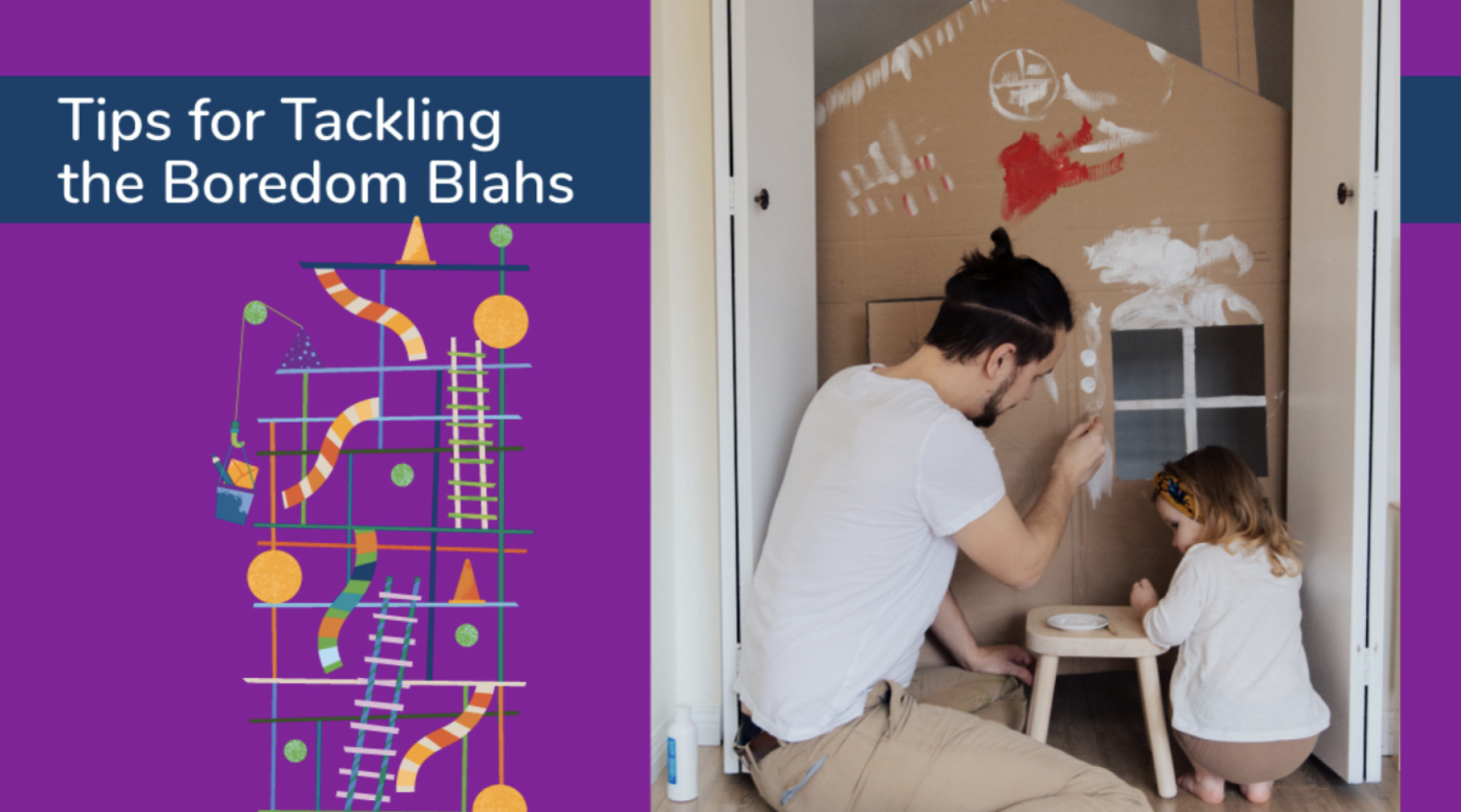
Tips for Tackling the Boredom Blahs
Kids are hard-wired to play. But even for children, the free and imaginative play that research shows is best for their development doesn’t always come easily. Sometimes their energy levels are low, daily frustrations are too high or they just can’t seem to find the inspiration to create their own fun. That’s when the dreaded “I’m bored” comes out.
Parents and caregivers have a huge impact on their children’s relationship to play. During times when there are obstacles to free and creative play, it helps for adults to lead by example. Here are a few tips for how you can help motivate and inspire play:
Show that you’re eager to play, too
Sometimes, kids just need a jumpstart. If they’re dragging their feet or don’t seem open to your suggestions, find a toy or activity you enjoy and start doing it on your own.
-
- Speak aloud about what you’re doing and how you’re finding some joy in the break from your routine.
- Make a mistake and wonder out loud how you’ll manage to fix it.
- Set up an imaginative scenario that requires another character (what fun is a tea party for one?)
Kids love to be problem solvers, so chances are your child will jump in sooner than later and run with it.
Model confidence
Kids’ hesitancy to play can sometimes come down to a lack of confidence in the activity. Instead of indulging their worries and moving on to something new, remind them that they’re capable and that all new things take practice.
Show kids that confidence is a lifelong journey by modeling some of those behaviors yourself. Do you struggle with talking to new people? Take a deep breath and try. Are you a beginning snowboarder? Get out on the (bunny) slopes. Then, talk through with your kids what it’s like to tackle fears, fail and bounce back up.
Cooperate
Arguments can be a fast track to the end of playtime. When you sense that kids aren’t able to resolve a conflict on their own, it’s normal to step in and help them cooperate. This doesn’t mean telling them what to do, or who’s to blame.
-
- Instead, step into the situation, figure out what’s going on, and then cooperate as a peer.
- Offer up compromises that let everyone’s ideas have time to shine. “It seems like you all want to play a different game. What if we tried my game for five minutes, then yours, then yours?”
- Leave space for conversation between the kids to voice how they’re feeling without judgement. Most often, frustration comes from feeling like you aren’t being heard.
Your positive influence not only keeps the play going, but offers them tools for next time there’s a disagreement.
Show off your own flexible thinking
People who have flexible thinking skills are able to adjust to change, think hypothetically and take in new information and use it to shift their ideas. Adults have had more practice than kids have at these skills, so talk through your own flexible thinking as it happens. Imagine that a planned playdate was canceled. That’s disappointing!
-
- Ask your child how they’re feeling and make sure they know that they can speak openly.
- Ask your child to put themself in the other person’s shoes. How do we think they might be feeling right now?
- Talk about what else you might be able to do instead, and think about when you can plan a new playdate. Model it in your own grownup life: maybe your car broke down so you can’t get to an appointment on time. Express your frustration but talk through your alternative options.
Show kids that flexible thinking takes practice, but we can all support each other.
These are just a few ways that you can model the behaviors you hope to cultivate in your child. When you lead by example, you show that someone they trust is still growing and changing, just like they are! And always remember that progress isn’t a straight line. It takes repeated practice to build habits, especailly at a young age.

SUPPORTING A CHILD’S PLAY
SUPPORTING A CHILD’S PLAY
Playful Mindset Turns Chore Time into Play TIme
There’s no way around it: There are always chores to do and errands to run.
Those responsibilities don’t have to be a drag on an otherwise lovely day. What if, instead, they became a way to engage with kids and have some playful time together?
Three Tips to Get the Most Out of Screen Time for Kids
Study after study shows that engaging with technology alongside your child helps them get the most out of it.
Helping Kids Manage Stress
While we can’t keep kids from feeling stressed, we can play a crucial role in helping kids feel safe and secure during stressful times.
Tips for Supporting Social-Emotional Learning in Kids
Tips for Supporting Social-Emotional Learning in Kids The pandemic undeniably affected many kids’ social-emotional development. Some studies show that younger kids are often behind in developing the skills to identify and manage big emotions – critical skills for...
Benefits of Mud Play
Playing with Mud: Why It's Worth the MessMud is messy. It’s sloppy and squishy and dirty. But it’s also a great tool for discovery and growth through play. From supporting cognitive development to boosting creative thinking and self-confidence, it turns out that mud...
Three Tips to Help Kids Recognize and Process Emotions
Three Tips to Help Kids Recognize and Process EmotionsAs parents and caregivers, part of our job is to pay close attention to kids’ emotions and help them recognize, identify and process the incredible range of human feelings. It’s not always easy! In fact, it’s often...
Play Boosts Emotional and Mental Health in Kids
Play Boosts Emotional and Mental Health in KidsIt’s no secret that the amount of time kids spend playing has been declining. In fact, kids growing up today play an average of eight hours less per week than children did in the 1980s. The trend has prompted warnings...
Getting Past “Yes/No” Answers: The Power of Open-Ended Questions
The Power of Open-Ended Questions You probably ask your child lots of questions every day. But did you know that how you ask your child questions has a big impact? It’s true! By asking open-ended instead of closed-ended questions, you help boost critical and creative...